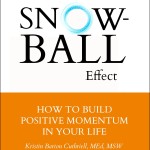 Make self-compassion part of your personal snowball effect. It really will move you to great places!
Make self-compassion part of your personal snowball effect. It really will move you to great places!
How we treat ourselves will impact all of our relationships. Letting go of harsh judgments and learning to be compassionate toward ourselves enables us to better love others. Without self-compassion we go around projecting all of our own self-contempt, harsh judgments, and criticisms onto everyone else. If we love ourselves, we spread love. If we are full of self-contempt, we spread criticism, negativity, and judgments. True self-love is full of compassion and is rooted in security. Narcissistic love is about the ego and is rooted in deep feelings of inadequacy. Individuals who are filled with true self-love are able to spread genuine love to others.
Self-compassionate people experience greater intimacy in their relationships. People who treat themselves with kindness are more likely to experience true intimacy within their relationships. Intimacy involves exposing insecurities and allowing one’s self to be vulnerable with another person. People who are critical of themselves tend to avoid intimacy because they assume others will judge them as harshly as they judge themselves. They often hide their true self, thinking exposure will result in rejection. This projection not only obliterates any chance of intimacy, but it sometimes leads to verbal or physical aggression.
Self-compassionate people are less aggressive. People filled with self-contempt project their feelings onto others and then become angry with the person holding their projection. In other words, they assume that others judge them harshly, and this makes them furious. They do not realize that the judgments that anger them are coming from within. They may retaliate and act out in aggressive ways, never knowing that they have created their own version of reality.
Self-compassionate people admit and learn from their mistakes. People who treat themselves with kindness allow themselves to make mistakes without becoming defensive or assigning blame to others. They allow themselves to make mistakes because they know that mistakes are part of the human condition. They know that no one is perfect. These people view mistakes as learning opportunities. They know that failing a test does not make them a failure. When they experience defeat, they get back up without engaging in self-pity. They know that their mistakes do not define them, and because of this, they are less defensive and better able to establish healthy relationships.
Self-compassionate people hold themselves accountable for their actions. They know that their mistakes don’t define their worth, and they can therefore accept personal accountability for their actions without blaming, denying, or rationalizing their unacceptable behaviors. These people don’t make excuses. They are not threatened by their mistakes. This personal accountability creates positive momentum and spills over into their relationships.
 This post is an excerpt from the book, The Snowball Effect: How to Build Positive Momentum in Your Life. If you have a history of being overly self-critical, this book will show you how to let go of those harsh self-judgments so that you can improve your relationships and experience a lot more joy in life. The book is now available on amazon.com and barnesandnoble.com It is available in both soft cover and kindle edition.
This post is an excerpt from the book, The Snowball Effect: How to Build Positive Momentum in Your Life. If you have a history of being overly self-critical, this book will show you how to let go of those harsh self-judgments so that you can improve your relationships and experience a lot more joy in life. The book is now available on amazon.com and barnesandnoble.com It is available in both soft cover and kindle edition.
Leave a Reply